|
|
|
Sort Order |
|
|
|
Items / Page
|
|
|
|
|
|
|
| Srl | Item |
| 1 |
ID:
168878
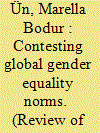

|
|
|
|
|
| Summary/Abstract |
Over the past two decades, constructivist International Relations (IR) scholars have produced substantial knowledge on the diffusion and adoption of global norms, emphasising the role of Western norm entrepreneurs in constructing and promoting new norms to passive, generally non-Western, norm takers. An emergent literature on norm dynamics unsettles this narrative of linear progress, highlighting the agency of diverse actors, including the agency of non-Western norm entrepreneurs, in normative change. This article contributes to this recent norm research by exploring the normative agency of local actors in the Turkish context, who have actively engaged in normative contestation over the meaning of gender equality. More specifically, the article reveals the crucial role of a pro-government, conservative women's organisation in subverting global gender equality norms and in promoting a local norm of ‘gender justice’ as an alternative. The article furthers research on norm contestation by analysing the discursive strategies and justifications local norm makers have adopted in the Turkish context upon encountering norms that challenged their normative beliefs and practices. Finally, the article critically engages with postsecular feminism, highlighting the agency of a religiously informed, conservative women's organisation as a non-Western norm entrepreneur.
|
|
|
|
|
|
|
|
|
|
|
|
|
|
|
|
| 2 |
ID:
119975
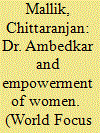

|
|
|
| 3 |
ID:
119944
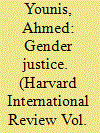

|
|
|
| 4 |
ID:
164922
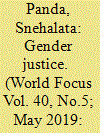

|
|
|
|
|
| Summary/Abstract |
Gender justice has stumbled into a quagmire of patriarchal orientations so much so that attempts to push forward an environment free from gender prejudices has remained elusive despite incessant social engineering processes. Institutional interventions have broadened the space for human self-realization but treading the path is difficult for women due to the unexpected hazards manifesting in most violent manner. Fighting against gender discrimination is a war against civilization and winning such a war is not easy.
|
|
|
|
|
|
|
|
|
|
|
|
|
|
|
|
| 5 |
ID:
164938
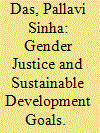

|
|
|
|
|
| Summary/Abstract |
The roots of gender injustices can be traced back into the formal and informal membership of various social institutions that is family, the community, the market, the state, and even the institutions of established by religion. In one or another, these institutions are supposed to settle disputes, establish and enforce legal rules, and prevent the abuse of power.
|
|
|
|
|
|
|
|
|
|
|
|
|
|
|
|
| 6 |
ID:
193029


|
|
|
|
|
| Summary/Abstract |
This research problematizes the contested nature of the global norm diffusion by focusing on intra-group rivalries and fragmentations shaping local responses (often reactionary and resistant) to global norms. Such an examination is important primarily to account for what leads to shifts in the local reception of norms over time. This study empirically explores local fragmentation, rivalry and change in response nexus in the example of the reception of the global gender equality norms in Turkey by the conservative normative bloc. It reveals that the conservative bloc is not a monolithic normative order and that there are two main competing receptions of the gender equality norm within the group in Turkey. With a firm emphasis on Turkey’s first initiating and later withdrawal from the Istanbul Convention, the study elaborates how the institutionalized conservative response to gender equality has shifted from a compromising acceptance to a rejection over time.
|
|
|
|
|
|
|
|
|
|
|
|
|
|
|
|
| 7 |
ID:
183506
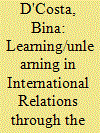

|
|
|
|
|
| Summary/Abstract |
As an auto-ethnography, this essay offers my learning and teaching in International Relations through the politics of margins and silences. I note that recentering margins and unpacking multiple silences are not so simple. They generate their own discomforts and unlearning. Through my academic encounters of forging feminist relationships, debating race and racism, and efforts to decolonise knowledge in academia, I observe that these are compounded (and complicated) by everyday life and personal struggles. I maintain that despite crucial progress in the discipline, knowledge is being produced about people, who are actual repositories of knowledge and we have learnt little from them. While margins of the discipline is now a thriving and powerful space, it is appropriated by privileged voices, including those of feminists of global south and north, who are embedded in institutional and structural hierarchies. We need radical, multi-disciplinary methodological tools to decentre state and regional interests and unlearn some of the traditional ways we have been taught to think about what is IR and what is not.
|
|
|
|
|
|
|
|
|
|
|
|
|
|
|
|
| 8 |
ID:
094173
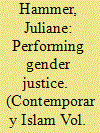

|
|
|
| 9 |
ID:
130970


|
|
|
|
|
| Publication |
2014.
|
| Summary/Abstract |
Many conflicts in the Asia-Pacific region have included sexual violence crimes targeted primarily against women. However, in comparison to other regions, Asia-Pacific states have been reluctant to embrace international law innovations to end impunity for such crimes into the future, as evidenced by their unwillingness to become signatories to the Rome Statute of the International Criminal Court. Of the 39 countries constituting the Asia-Pacific region, only 17-less than half-have joined the Rome Statute. This article initially surveys some of the reasons for non-ratification of the Statute. It further examines the role of civil society and the potential normative impact of the Statute to enhance national sexual violence legislation and prosecutions. Finally, it identifies some practical steps that the Australian government could take to encourage regional states to ratify, implement and enforce the Rome Statute in order to further protect all victims of international crimes and bolster the broader Women, Peace and Security framework.
|
|
|
|
|
|
|
|
|
|
|
|
|
|
|
|
| 10 |
ID:
169052
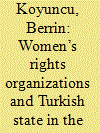

|
|
|
|
|
| Summary/Abstract |
In this article, we aim to explore the shift in the relationship between the state and women’s rights organizations (WROs) in Turkey in the post-2011 period, which was evinced in rising tensions between gender equality and gender complementarity discourses. We argue that, in the process of the vernacularization of global and/or international gender norms in Turkey, the conservative gender policy of the government corresponded to the endorsement of ‘gender justice,’ a particularistic approach formulated with reference to Islam. As such, the vernacularization of universal gender norms opened the way for the state in Turkey to solidify its legitimacy by instrumentalizing social divisions, marginalizing opposition WROs, and aligning with government-oriented organizations.
|
|
|
|
|
|
|
|
|
|
|
|
|
|
|
|
| 11 |
ID:
137150
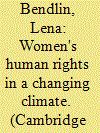

|
|
|
|
|
| Summary/Abstract |
A women's rights perspective can inform and structure research on climate policy impacts on women. To date, climate policy analysis has mostly considered women as agents of climate protection, that is, objects of mitigation policies, rather than subjects in their own right. However, climate change mitigation involves direct and indirect distributive effects depending on which sectors are involved, which instruments are chosen and how funds are obtained and allocated. Since gender roles impact on individual livelihoods and activities, distributive effects are likely to be gendered. This paper suggests that women's human rights can be used as a framework for research aiming to fill this gap. They provide a well-developed, tested range of criteria for gender justice. Such assessments would allow for a more systematic and comprehensive understanding of the gendered distributive effects of climate policies, notably with regard to the particularly understudied situation in the industrialized world.
|
|
|
|
|
|
|
|
|
|
|
|
|
|
|
|
|
|
|
|
|